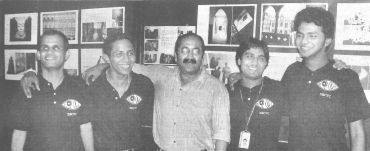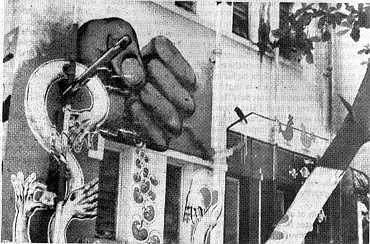Photographs: Business Standard Priyanka Jain
A photographer enables his visually impaired students to take up the camera.
Mahesh Umrrania lost his vision at age nine. He went to a school for the blind, and later earned a diploma in Indian classical music from Bombay University. He now plays the sitar. He claims to have vivid memories of the visual world, including colours, but does not remember the faces of his family members.
Umrrania met photographer Partho Bhowmick a few years ago. "Photography, which I learnt with Sir (Bhowmick), reconnects me to the visual world," he says.
Bhowmick read an inspirational article in an old magazine. It was about Evgen Bavcar, a blind photographer in Paris. With that began a year-long effort to understand the world of the visually impaired.
"I founded Blind with Camera, [an organisation] that gives step-by-step tutorials to the visually impaired to help them get started with photography," he says, "and also to guide sighted photographers in starting photographic workshops with local visually impaired people."
In 2010 Bhowmick launched an online photography course for the blind, on www.blindwithcameraschool.org. The site meets accessibility standards for the visually impaired and is shortlisted for Nasscom's Social Innovation Honours 2011. Blind with Camera is a wing of the Mumbai-based Beyond Sight Foundation.
It is estimated that India has 15 million blind people, including one-fifth of the world's blind children. Millions more suffer from low vision or are at risk of blindness.
Donate a working camera or equipment: Blind with Camera needs still (film or digital) and video cameras, lenses, filters, tripods, flashes, film, memory cards and more. You can offer temporary use of studio space, resources and digital labs.
Email: supportus@blindwithcamera.org.
Buy blind artists' photographs: Prices for the limited-edition prints range from Rs 5,000 for a 16"x20" print to Rs 12,500 for a 24"x36" print, plus packing and shipping.
He helps the visually-impaired take up photography
Image: An image captured by blind photography student SatvirThe prevailing attitude in Indian society is that blind people must rely on sighted people for everything from transportation to economic survival," says Bhowmick. But the Blind with Camera project aims to enhance the incomes of blind artists by enabling them to sell through renowned galleries.
"We have begun exhibiting only at commercial art galleries like NCPA and Kala Ghoda in Mumbai or India Habitat Centre in Delhi, where our artists get more mileage for their work."
So that the blind can experience their own work, Blind with Camera ensures that the photographs are touchable raised images. Photos are supported by Braille notes, large text and visual aids.
"For low-vision artists, we provide equipment to magnify images so that they can see what they have captured. For the visually impaired, we give audio support and embossed images to help them understand what they have through glass covered with thick grease. The farther the object, the foggier it appears." He went to a school for the blind, and now works as a computer instructor.
Singh learnt photography from Bhowmick. "I can see the three-dimensional visual world much more clearly in the photo print by bringing it close to my eyes and with the magnifiers provided by Blind with Camera," Singh says. "Photography really helps me to see well."
To involve a wider set of individuals in Blind with Camera, Bhowmick plans to hold Blindfold Photography Workshops at media schools, where students will learn the art of photography using non-visual senses. "Trainers will include visually impaired photographers," he says, leading to a "reversal of roles. Later, work coming out of the blindfold photography workshop will be exhibited along with work from the Blind with Camera project, and all money raised will be ploughed back for blind artists."
Blind with Camera bagged an order from the NGO Child Relief and You to document child disabilities. The images will be used on greeting cards and gift items. "We are also launching paid photography courses for sighted artists who would like to learn blind art and sharpen their senses," says Bhowmick.
Donate a working camera or equipment: Blind with Camera needs still (film or digital) and video cameras, lenses, filters, tripods, flashes, film, memory cards and more. You can offer temporary use of studio space, resources and digital labs.
Email: supportus@blindwithcamera.org.
Buy blind artists' photographs: Prices for the limited-edition prints range from Rs 5,000 for a 16"x20" print to Rs 12,500 for a 24"x36" print, plus packing and shipping.




Comment
article